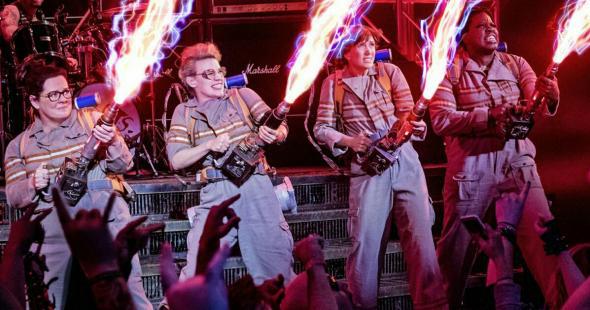Ghostbusters opened this past weekend to $46 million—right in line with earlier projections. As Deadline reports, this total also marks a career high for both director Paul Feig and star Melissa McCarthy, and critics’ reviews have been mostly positive (if somewhat less so from male critics than female critics). Still, Ghostbusters’ box office total isn’t quite the gangbusters amount (yet) that would justify the movie’s large budget of a reported $144 million, and it faces a tougher sell overseas since comedies don’t always translate internationally.
So of course, the question on everyone’s minds is: Does this spell doom for future female-led big-budget films, comedies or otherwise?
It’s an inane question, but it’s difficult to fault anyone for asking it—or for urging people to flock to theaters in the name of social activism—given that we still live in a world where the mere existence of a female-led big-budget film is an anomaly, where the movie’s reception has been defined by backlash from internet sociopaths and where studio execs have been known to cite isolated failures as justification for not greenlighting more blockbusters that center on women.
Instead of looking at the myriad ways in which Ghostbusters was practically set up to fail—its difficult-to-recoup budget, its “safe” PG-13 humor (where all Feig and McCarthy’s other comedies have been filled with R-rated jokes), and its attempt to restart a franchise based on a movie that wasn’t particularly great to begin with—there’s a good chance producers will see its downfall primarily as due to its casting of women and the fanboys it angered. (The critical and commercial dud that was Independence Day: Resurgence last month doesn’t mean that the industry will stop producing unnecessary reboots of decades-old hits fronted by men. Indeed, that question was never even posed.) It also seems unlikely that producers will take from these relatively disappointing box-office numbers a sign that maybe McCarthy, Wiig, Kate McKinnon, and Leslie Jones may have been better served with brand new material, à la Bridemaids, The Heat, and Spy.
Indeed, despite its underwhelming performance, Sony seems intent on doing a sequel, which indicates that Wiig, McCarthy, and Feig will probably be fine. At this point, they have a proven track record at the box office (especially off of considerably smaller budgets more typical of comedies). The greater concern is for those more up-and-coming female stars, who often aren’t given the same benefit of the doubt granted to their male counterparts, simply because big-budget movies starring women are still seen as a novelty.
